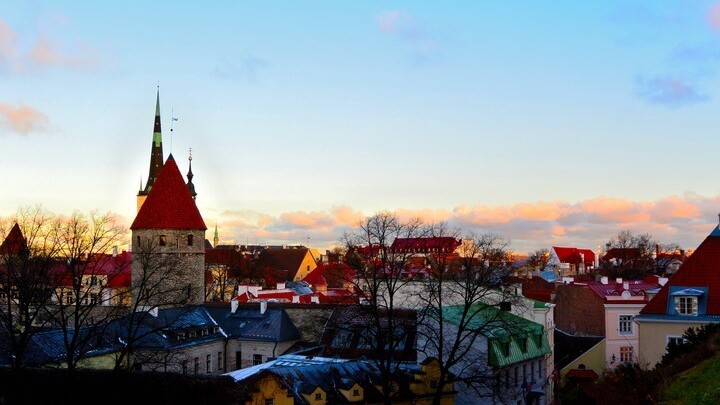
It seems fitting that as I start piecing together the fragments of interviews and notes gathered over the past months that it has been just over a year since Estonia’s innovative e-Residency program began, which is where my fascination with Estonia began and this story starts.
As someone who has lived in three countries and has projects and personal connections all over the World, the concept of being a ‘virtual’ citizen, if only for business purposes, was instantly appealing.
I won’t go into detail on the program itself, but I want to start digging beneath the surface of Estonia by stating the program’s aims.
… To have 10 million e-Estonians by 2025…
These are lofty goals for small nation of 1.3 million people that many would struggle to place on a map and has existed in it’s current form for 25 years. Despite this and a brutal, tear-jerking national history where the past 500 years have seen less 60 years of independence, Estonia is eternally optimistic.

While some nations would use this history as excuses to be insular, Estonia has always sought how best to take advantage of its’ legacy. It will never be a country in the middle of Europe with 60 million people and embraces this fact wholeheartedly.
Much has been written about Estonia’s embracing of the digital present and I wanted to dig beneath the surface, speaking to entrepreneurs, employees and government to ascertain the underlying motivations and well as the realities of living in this tiny Baltic nation.
The spark
Often any kind of movement needs a spark and to Estonia that came in the form of Skype, the first of many companies you probably never realized originated in Estonia.
While primary industries still form a large percentage of the Estonian economy, it took Skype to show that alternatives existed. It may have its critics (and now an American owner), but Skype’s legacy is everywhere in the Estonian tech and entrepreneurial landscape. Ex-employees provide valuable experience on fulfilling an idea, but more crucially, with a user base of 100s of Millions, they provide proof on what’s possible.
A necessary global outlook
All modern Estonian entrepreneurs start with a Global outlook from day 0. There is no choice and this is liberating in some ways. Ideas always have a global open outlook and are not distracted or tainted by focussing on local tastes and idiosyncrasies that struggle to scale. Like many European startups, the core of the business typically remain in Estonia, but satellite offices open in local markets when needed.
A great example of this is Pipedrive , a sales and pipeline CRM, has 100 staff in Estonia (largely engineering) and 20 in the USA handling support and marketing.
Another is Toggl , A globally successful time tracking app bootstrapped by it’s founders keep it’s only office based in Tallinn but has staff spread all over the world. Working from home offices, coworking spaces, cafes and beaches from Brazil to Thailand.
Taking the concept further is Sentab , a TV based social network aimed at the elderly. Gary Planthaber, their CTO is originally from Florida and is a perfect fit for the company as 100 percent of their business is outside of Estonia. He puts Estonia’s success down to low operating costs balanced with a high level of education, a near-perfect combination.
English thrives

Continuing the global outlook, the level of English spoken in Estonia (According to the EF English Proficiency Index) ranks highly alongside it’s Nordic neighbors. Estonia ranks globally at number seven (out of 70 in Europe), which is down from 2014, but still places it higher than larger neighbors such as Germany.
For businesses that look globally there is little choice but to speak English and with Estonian on a par with Finnish in language complexity, any company wanting to attract international hires and customers has no choice but to adopt the World’s most common workplace language.
A nation of introverts great at PR
Many people I spoke to felt that Estonia is great at international PR and a master of one of my favorite concepts, Soft Diplomacy. In some ways the history of the country has inspired this attitude. After frequent invasions and with no real hope of physically defending itself, the national attitude is to make friends as much as possible in the hope that if the shit ever hits the fan again, someone bigger will come and help.
While Estonia excels at PR globally, locals feel that it fails internally, with people reluctant to be supportive to others, generally only voicing negative opinions.
Kristi from the awesomely named Jää-äär (which translates as “edge of the ice”, an awesome little place to hang out and drink Vana Tallinn) bar in Berlin mentions and old phrase that reflects more of an Estonia from the past:
The favorite meal of an Estonian is another.
This attitude can manifest itself from Nationalism, to political and business scandals or just plain and simple misunderstandings. Kristi points out that this national attitude is rapidly changing and the constant exchange of Estonians living and working in other countries and vice versa has helped bring the country back in from the “cold” (pun intended).

The e-residency program is one part of this larger strategy to take a lead in engaging people and has so far been successful in sparking conversation and change.
A young and enthusiastic government
While few Western countries actively seek to discourage economic progress, there are those that obstruct it less than others. Much of the entrepreneurial spirit present in Estonian businesses is also found at a Government level and a small population helps them experiment and iterate ideas.
The Government has opened a surprising amount of data and services to online participation that puts other nations to shame. Want to open a business? Ten minutes on-line. Pay your Taxes? Just click a few buttons. Vote? 2007 saw the Worlds first online national election, with some controversy surrounding it, but you’ve got to start somewhere.
Members of parliament are generally young, open to discussion with voters and aren’t afraid of considering controversial thoughts. Scrapping nation states and Government-as-a-service anyone?
At the moment much of the programs lofty ideas are filled by projects created at regular hack events, such as Tsutomu Gabriel Komori’s eSparQNow for 1-Click company registration in Estonia.
Kaspar Korjus, the e-Residency program director philosophizes:
I can see a future where the current concept of the nation state is defunct. Government is like another enterprise and goes to other governments for services they need, just like any other profitable business… What if in the future Estonia has more e-residents than physical residents who contribute more tax? Should they be allowed to vote and have a say in the running of our country?

While there are activist communities who have campaigned for breaking down nation states and borders in the pursuit of freedom, I find it ironic (but not surprising) that what may cause this is born from an idea that is just good business.
There are some who aren’t so positive about the Government’s approach, especially the infamous doteebubble. Critics claim that too much Estonian Entrepreneurship is propped up by the Government and EU funding. This may be true at a starter level, but as startups grow, there is no choice but to seek financing from elsewhere and the offering of funding and grants to small innovative businesses is not unique to Estonia.
Entrepreneurship is mainstream
Entrepreneurship is an increasingly popular global lifestyle choice and path that people strive to follow. But in Estonia it’s not considered a ‘crazy idea’ to quit your steady, consistent and reliable job to test drive an idea, it’s positively encouraged and supported.
There are even popular TV shows about entrepreneurship and it’s seen as a viable path to follow.
An agile economy
The Estonian economy is fast to fail, but also swift to recover. After moving away from the USSR and communism in 1990s it became something of a ‘Baltic Tiger’, the first country to adopt certain tax reforms, ranking well against other similarly sized countries in Europe. The GFC of 2008 hit Estonia worse than most but within the past years, after an effective series of austerity measures, it has pulled itself back.
Growth and GDP per capita are rising and unemployment is falling, all at better rates than most EU countries. It has a high credit rating, low Government debt, near energy independenceand is on track to be in the top 5 most productive nations in the World by 2025.
Common to small nations, Estonia suffers from a skills shortage, with large quantities of it’s young jetting off to other countries to seek work. This has led to businesses importing overseas talent, but they sometimes struggle to match wage expectations of employees from countries like the UK and USA.
Close but close enough?
Leading on well from discussions on economy, one recent blot on Estonia’s record was the collapse of the national Airline, Estonian Air. It received over €85 million in funding to aid restructuring efforts from the European Commission, but failed to carry out these steps enough to satisfy the commission.

Other airlines are starting to fill the gaps in service it left, but despite one of the most amazing airports I’ve ever seen (themed gates, background noise of birds and sung security announcements anyone?) our plane back to Berlin only had about 40 people on it. That could say more about Berliners than Estonians. Entrepreneurs mentioned the lack of longer distance international connections (To the USA and Asia for example) as minor inconveniences when they travel for work.
Local competition rising
While Estonia out-competes it’s Baltic neighbors and considers itself more of a Nordic than Baltic nation, it’s starting to feel them snapping at it’s heels, especially Riga in Latvia. It’s a more populous city, has a larger airport and is fast catching up with the number of start-ups and opportunities for startups.
Tallinn is close to Helsinki, and Finland is another hotbed of startup activity, playing host to Slush, one of Europe’s largest startup events. Arctic Startup has a great overview of infographics if you’re interested in looking at the numbers for the Baltics in more detail.
Are some more equal than others?
With a country that has moved so fast towards digital adoption I wondered if particular sections of the population felt left behind, for example, older citizens. I was assured that the older population were some of the most avid fans of Estonia’s digital governance. Voting and submitting taxes online isn’t just convenient for busy young types, but also those who find it hard to get out and about.
Marek Unt from TransferWise (and with years of experience working with and for the Estonian startup scene) made an interesting statement:
Everyone benefits from Estonia’s successful startup scene and the international acclaim it brings, even if they don’t directly access the benefits.
TransferWise is not only one of Estonia’s most successful startups, but one of Europe’s most successful startups, revolutionizing international money transfer. They have attracted funding from Richard Branson (amongst others), have 450+ staff around the world and are transferring more than $700 million across the globe every month.
Andres Pihor from Ignite, a software development based in Tallinn mentioned successful programs in the early 00s that helped older citizens learn essential digital skills.

Unfortunately, when it comes to gender, things are a little different. According to a Eurostat report from March (based on numbers from 2013), Estonia has the highest gender pay gap of European member states (29.9 percent). In the startup and tech worlds this is a slightly different story but some women reported stories of being spoken down to and taken less seriously.
Karoli Hindriks mentions that when she founded Jobbatical in 2014, she was Estonia’s second female founder and there is a distinct lack of female founders in the country.
Karoli founded Jobbatical in 2014 after wanting a meaningful career break and not finding any options for finding one. The start-up matches candidates with companies around the world and has about 500 open vacancies for those of you looking for a change. This isn’t her first entrepreneurial venture, she helped start MTV in Estonia and created the curious reflectors you see everyone wearing at night in the country so they can be seen by car drivers.
Marina Shutova and Gleb Maltsev from Stoneful, content writers extraordinaire, addressed a question brought up in regards to some negative aspects of the country.
How’s it different from the rest of EU, US, or say, Russia? The country is tiny. You can try things out that you can’t elsewhere, but it also means that everyone knows each other. It’s damn hard for folks to talk about controversial issues.
However, they go on to mention a recent call for diversity from the foreign chambers of commerce in Estonia.
Diversity is sensitive. Public leaders could be marginalized for addressing it. It takes someone with balls to start the conversation.
It remains to be seen whether it will become an active subject of debate for governmental leaders and something they can treat with equal agile speed as other topics.
Conclusion
To someone like myself (and to many of you) a country like Estonia can seem an attractive and appealing place. Flexible, fast moving and open-minded are not words typically used to describe countries and governments.
While I still feel it would be too small for me to ever consider moving to there’s something about the country and its history, location and attitudes that entices me to keep discovering more about what makes it tick. I had the good fortune to visit several of Europe’s smaller countries in 2015 and have become fascinated with the ways these nations are trying new ideas because they have no choice and nothing to lose. Estonia is by far one of the most advanced and successful on this list and I hope this article bought some insights to you beyond the PR headlines.
Read next: Are you ready to become a digital citizen?
Get the TNW newsletter
Get the most important tech news in your inbox each week.




